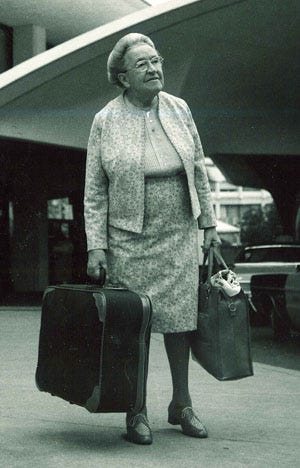"By faith Abraham obeyed when he was called to go out to the place which he would receive as an inheritance; and he went out, not knowing where he was going." —Hebrews 11:8
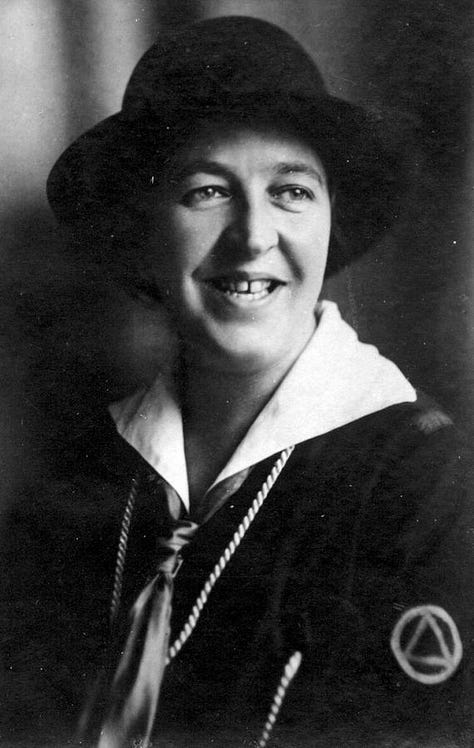
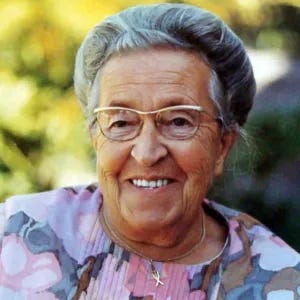
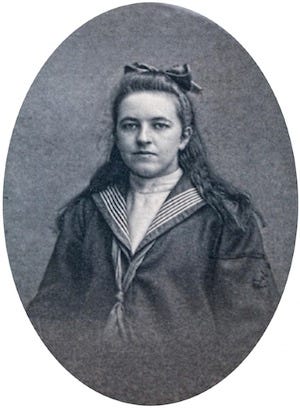
Cornelia Arnolda Johanna "Corrie" ten Boom (April 15, 1892 – 15 April 1983), in 1922, became the first female certified watchmaker in Holland. She worked and lived with her father and older sister above their shop (half a block from police headquarters). Together they hid Jews and members of the Resistance in their home, were eventually caught and sent to concentration camps, where her father and sister died. Incredibly, they saved an estimated 800 Jews.
She is best known for her international best seller "The Hiding Place" (1971), which sold over 3 million copies in the US alone, and the 1975 film by the same name. Another best seller was "Tramp for the Lord" (1972) written with Jamie Buckingham, which contains dispatches from her amazing travels throughout Africa, Asia, the Americas and Europe, including the USSR, Cuba and China!
More recently, the film "Return to the Hiding Place (War of Resistance)" (released 2011 in the UK; 2013 in the US) has introduced Corrie ten Boom to a new generation. Based on a book by Hans Poley, the sequel of sorts gives a broader view of her work and the people in her circle.
A Bold Mission
In 1944, the Gestapo arrested over 30 people hiding in the Ten Boom house. Maintaining 30 guests was theoretically impossible since food was in very short supply, but Ten Boom explains the miracle that made it possible. When she went to pick up her family's ration cards, the man in charge (someone she knew) asked how many cards she needed. She was about to say "five," but "one hundred" slipped out and before she could protest, he kindly handed her what she requested.
She and her sister somehow conducted nightly worship services as inmates in Ravensbrück Concentration Camp for women, and smuggled in a bible. All this was punishable by death.
Three days before her sister Betsie died on 16 December 1944 at age 59, she told Corrie, "God showed me that after the war we must give to the Germans that which they now try to take away from us: our love for Jesus." She patted her hand and said, "Corrie, there is so much bitterness. We must tell them that the Holy Spirit will fill their hearts with God's love."
Betsie whispered on, "This concentration camp here at Ravensbrück has been used to destroy many, many lives. There are many concentration camps throughout Germany. After the war they will not have use for them anymore. I have prayed that the Lord will give us one. We will use it to build up lives." Her voice quivered, "The Germans are the most wounded people in all the world."
Ten Boom admits to thinking, "No, I will return to my simple job as a watchmaker...and never again set my boot across the border." But Betsie continued, "Then we will travel the whole world bringing the gospel to all--our friends as well as our enemies."
The night after her sister died, she couldn't sleep. In the dim light she caught sight of a Russian woman searching for a place to sleep. "Thin and gaunt," she noticed a "hunted look" in her eyes. Russians were especially hated in the camp, and Ten Boom records that she can't imagine what it must be like to not even have a place to sleep in such hellish conditions. So she offered the woman her sister's empty spot next to her in the cot and soon found they could not communicate in any language. But when Ten Boom said, "Jesoes Christoes?" the woman exclaimed "Oh!" made the sign of the cross, and "threw her arms around me and kissed me."
Twelve days later, due to an administrative error, Corrie was released. She was 51 years old. A week later, her entire age group was sent to the gas chambers.
Ten Boom returned to Holland to endure the "hunger winter." Nonetheless, she opened her home to people with disabilities who were in hiding from the Nazis.
Post-War Global Ministry
After the war, Corrie Ten Boom opened a rehabilitation center in Bloemendaal for concentration camp survivors and Dutch collaborators with the Germans who now found themselves to be pariahs and unemployable. After 1950, it opened to anyone in need.
In 1946, she returned to Germany and met with and forgave two German Ravensbrück guards, one of whom had been especially cruel to her sister.
(This was not unusual. Some Jewish Holocaust survivors even sought and found safe shelter in the home of a former labor camp overseer in the chaotic time immediately after the war -- a major lesson is that all divisions are man-made and therefore false, and only exist because someone is attempting to divide and rule.)
In chapter 4, "A Song In the Night," of "Tramp for the Lord," Ten Boom visits her old watchmaker's shop, no longer hers, after the war. Looking back on all that had happened in the previous year, seemingly centuries ago, in the stillness of the night she thought she could hear her father's thoughts, "What an honor to give my life for God's chosen people, the Jews."
She writes, "Then the chimes in the cathedral tower pealed forth once again, this time with the sounds of Luther's famous hymn 'A Mighty Fortress Is Our God.' I listened and heard myself singing the hymn, not in Dutch, but in German: Ein' feste Burg ist unser Gott. How like you, Lord, I half-chuckled, that you would remind me of your grace by letting me hear a German hymn....I was free."
Corrie ten Boom soon began traveling the world to deliver the gospel message of forgiveness, hope, love, and salvation through the saving grace of Jesus Christ.
She visited over 60 countries and wrote many books, most of which are now out of print.
In the USA
Notably, chapter 5, "A Great Discovery," of her book "Tramp for the Lord" records that the first few weeks of Corrie Ten Boom's trip to the US were uniquely disappointing.
After finally securing the paperwork to enter the US, she was shocked when she was thrown out of the YMCA in Manhattan after just 1 week, the maximum stay permitted. Fortunately, a woman offered her her son's room while he was on a trip, but nothing was going according to plan.
"The Americans were polite and some of them were interested, but none wanted me to come and speak," Ten Boom writes. Resistance to her ministry only increased with time. "Why did you come to America?" they began to ask. "God directed me," was her honest answer, to which they retorted, "Nonsense...we must use common sense. If you are here and out of money, then that's your fault, not God's."
Some common refrains were: "they were all busy with their own things. Some even said I should have stayed in Holland." And "we have ministers to tell us those things." And "too many Europeans come to America. They should be stopped."
After prayer and soul searching, she finally attended a Dutch service. "Ten Boom?" the well-known minister said, recounting a story he'd read about a Ten Boom who never ran out of a bottle of vitamins in a concentration camp. Realizing this was the very same Ten Boom, she would now be in demand. The editor of a Christian magazine called The Evangel gave her an important contact in D.C. and soon she had more speaking opportunities than she could accept during her 10-month stay.
Honors
The old Ten Boom family watchmaker's shop is now the Ten Boom Museum in Haarlem, Netherlands.
In December of 1967, Israel's Holocaust Museum Yad Vashem added her name to the list of Righteous Among the Nations.
Corrie ten Boom was knighted by the Queen of the Netherlands for her work during the war, and King's College in New York City named a women's dormitory in her honor.“If I create from the heart, nearly everything works; if from the head, almost nothing.” “Art must be an expression of love or it is nothing.” —Marc Chagall
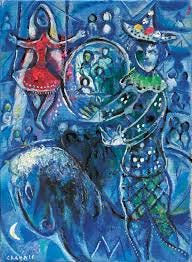
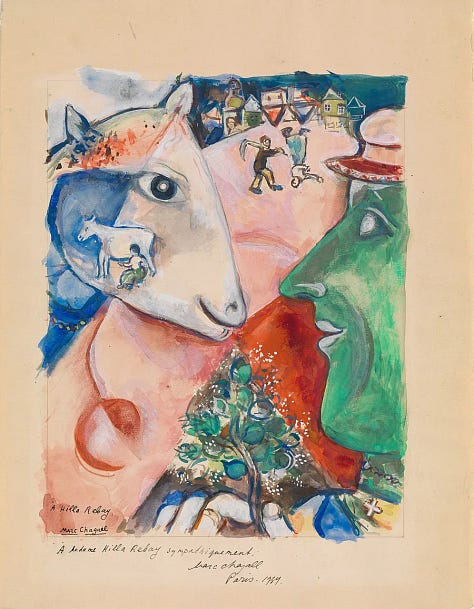
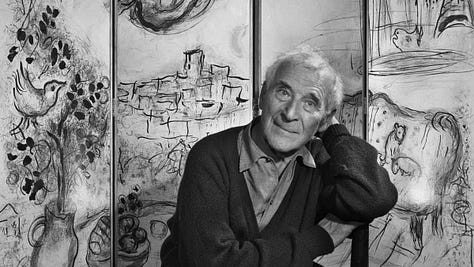
"We are heirs of the Most High!" -Brandon
·
The word gospel means GOOD NEWS and nothing more! What is the true gospel messgage? The gospel is simply the good news that God loves you! He loves each and every one of us so much he is going to redeem us if only we’ll let him!




